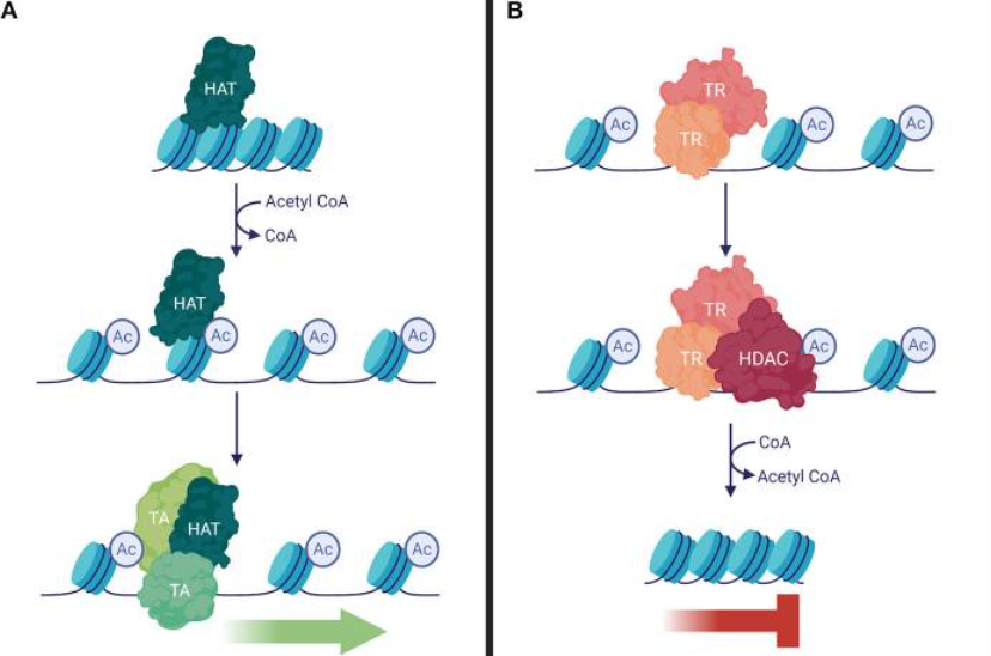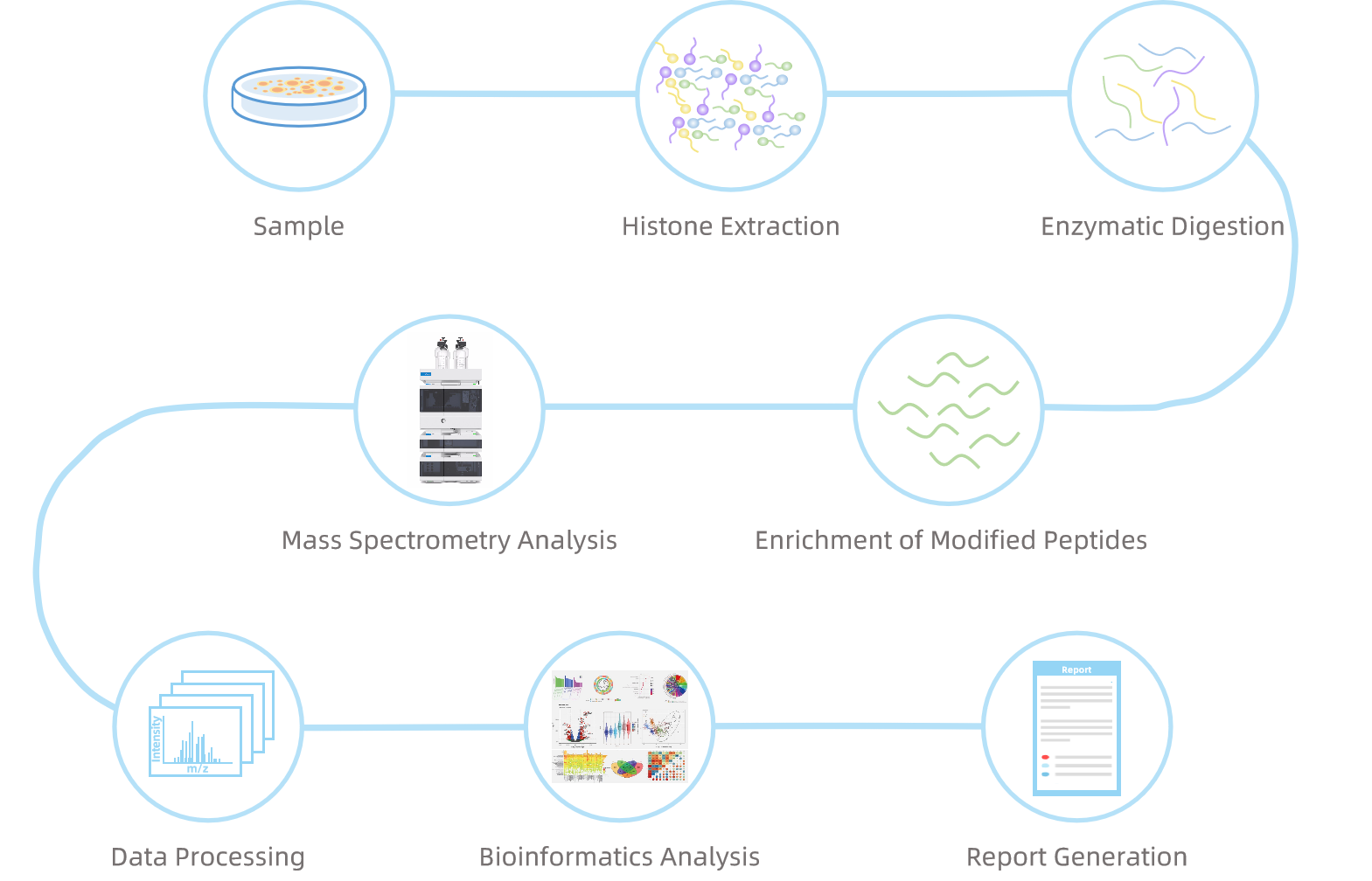Histone Acetylation Analysis
- Animal tissue ≥ 2 g
- Plant tissue ≥ 0.4 g
- Serum / Plasma ≥ 2 mL (plasma should be collected using EDTA as an anticoagulant)
- Urine ≥ 10 mL
- Cell ≥ 1 x 10⁸ cells
- Yeast / Microbial samples ≥ 0.4 g
- Protein samples: 2-5 mg (Standard tissue or cell lysis buffers can be used during protein extraction)
Histone acetylation is a pivotal post-translational modification that significantly influences chromatin structure and gene expression. This modification involves the addition of an acetyl group (−COCH₃) to the lysine residues on histone proteins. This modification occurs when histone acetyltransferases (HATs) utilize acetyl-CoA as a cofactor to acetylate lysine residues on histone proteins. The addition of the acetyl group weakens the electrostatic interactions between the positively charged histones and the negatively charged DNA. This reduction in interaction leads to a more relaxed chromatin structure, exposing DNA regions and facilitating the recruitment of transcriptional activators (TAs). Consequently, histone acetylation is often associated with transcriptional activation and is recognized as a hallmark of active gene expression.
Conversely, the dynamic equilibrium between histone acetylation and deacetylation is equally crucial for gene regulation. Transcriptional repressors (TRs) can interact with histone deacetylases (HDACs) to remove acetyl groups from histones. This deacetylation process strengthens the electrostatic interactions between DNA and histones, leading to a more compact chromatin structure that inhibits transcription. The balance between histone acetylation and deacetylation is essential for maintaining proper gene expression and cellular homeostasis.

Figure 1. Histone Acethylation and Deacetylation Mechanism
The role of histone acetylation extends beyond mere structural alterations; it also plays a pivotal role in regulating various cellular processes, including cell proliferation, differentiation, and apoptosis. Research has demonstrated that dysregulation of histone acetylation can contribute to a range of diseases, including cancer, neurodegenerative disorders, and metabolic syndromes. Understanding the dynamics of histone acetylation and its regulatory mechanisms is essential for elucidating these disease processes and developing targeted therapeutic interventions.
Services at MtoZ Biolabs
MtoZ Biolabs utilizes Thermo Fisher's Q Exactive HF, Orbitrap Fusion, and Orbitrap Fusion Lumos mass spectrometry platforms, in combination with Nano-LC, to provide a comprehensive solution for histone acetylation analysis. Simply provide your experimental objectives and send us your samples, and we will offer you a one-stop service from sample preparation and MS analysis to data analysis, delivering detailed identification and quantitative analysis of histone acetylation modifications and their modification sites.
Compared to traditional proteomics analysis, the key to histone modification analysis lies in the isolation and purification of histone components, as well as mitigating the impact of N-terminal lysine on the analysis of histone post-translational modifications. Since histones are located in the cell nucleus, MtoZ Biolabs has developed a specialized platform for histone extraction and purification, drawing on existing literature and experimental experience. Cells are homogenized and subjected to low-speed centrifugation to obtain the nuclei. The nuclei are then further disrupted to release histones and DNA. High-salt buffer is used to remove impurities, and High-Performance Liquid Chromatography (HPLC) is employed to separate different histone components, achieving optimal purity for subsequent mass spectrometry analyses. Additionally, to eliminate the impact of N-terminal lysine, we utilize 2-3 different enzymes to enhance peptide coverage in mass spectrometry analysis during the digestion process. This multi-enzymatic digestion increases the coverage of histone peptides, preventing the loss of post-translational modification information due to unsuitable peptide lengths or low ionization efficiency.
Analysis Workflow

Service Advantages
1. Advance Analysis Platform
Mtoz Biolabs established an advanced histone acetylation analysis platform, guaranteeing reliable, fast, and highly accurate analysis service.
2. One-Time-Charge
Our pricing is transparent, no hidden fees or additional costs.
3. High-Data-Quality
Deep data coverage with strict data quality control. AI-powered bioinformatics platform integrate all histone acetylation analysis data providing clients with acomprehensive data report.
4. Optimized Extraction
An optimized histone extraction and purification protocols are employed to minimize contamination and ensure high purity.
Sample Submission Requirements
1. Sample Volume
2. Sample Preservation
Samples should be shipped with dry ice. Avoid repeated cycles of freezing and thawing
Note: We will conduct testing on the provided samples. The formal experiment will commence only after the samples pass the quality check.
Deliverables
1. Comprehensive Experimental Details (Materials, Instruments, and Methods, etc.)
2. Relevant Liquid Chromatography and Mass Spectrometry Parameters
3. Detailed Information on Histone Acetylation Analysis
4. Raw Data
5. Mass Spectrometry Image
6. Custom Analysis Report
MtoZ Biolabs, an integrated Chromatography and Mass Spectrometry (MS) Services Provider, provides advanced proteomics, metabolomics, and biopharmaceutical analysis services to researchers in biochemistry, biotechnology, and biopharmaceutical fields. Our ultimate aim is to provide more rapid, high-throughput, and cost-effective analysis, with exceptional data quality and minimal sample consumption. If you are interested in our histone acetylation analysis services, please feel free to contact us. We are dedicated to providing you with the best service.
MtoZ Biolabs, an integrated chromatography and mass spectrometry (MS) services provider.
Related Services
How to order?







